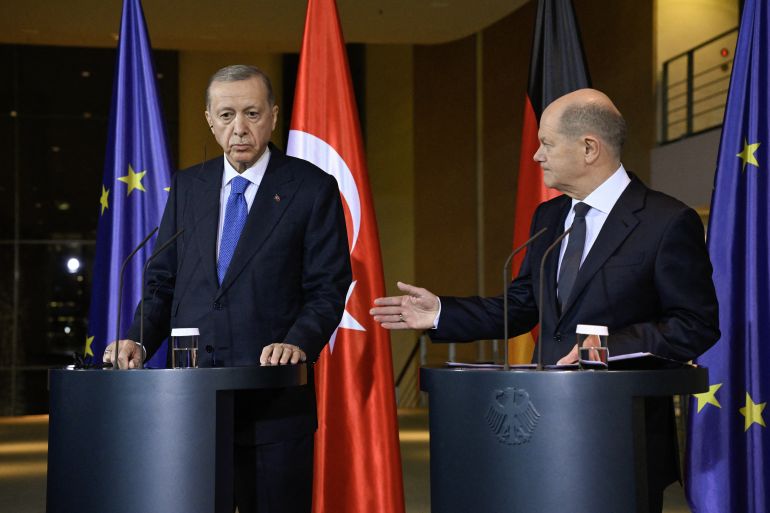Turkish President Tayyip Erdogan arrived in Berlin seeking common ground with German Chancellor Olaf Scholz on a range of contentious issues. The leaders, with opposing views on Israel’s recent escalation with Hamas and differing attitudes toward Moscow post-Ukraine attack, are driven by powerful economic and electoral incentives as they engage in discussions.
Erdogan’s Municipal Elections Gambit
President Erdogan’s visit, his first to Germany since 2020, strategically aligns with municipal elections where he aims to reclaim the key cities of Ankara and Istanbul. To sway voters grappling with high inflation and an economic crisis, Erdogan eyes the prospect of improved access to the European Union market and visa liberalization as potential game-changers.
Warplanes, Budget Gaps, and Migration: The Complex Agenda
Amid the heavily secured streets of Berlin, Erdogan’s demand that Chancellor Scholz greenlight Turkey’s purchase of 40 Eurofighter Typhoon warplanes, a deal involving Germany through Airbus, looms large. For Scholz, navigating a fractious three-way coalition grappling with a $65 billion budget hole and internal disputes, Turkey’s role in curbing migration to the EU positions Ankara as an indispensable partner.
Silence on Israel and Central Berlin on Lockdown
In a sign of the visit’s significance, Chancellor Scholz carefully sidestepped Erdogan’s vocal condemnation of Israel’s conflict with Hamas. Despite Erdogan’s characterization of Hamas as a “liberation organization,” Scholz refrained from direct criticism, emphasizing the absurdity of charges against Israel in general terms. Notably restrained, Scholz’s response contrasts with Germany’s traditional stance as one of Israel’s closest allies.
Central Berlin, under strict lockdown, reflects the gravity of the diplomatic mission. As Erdogan intensifies his verbal assault on Israel, Germany maintains strong solidarity with Israel while urging a focus on minimizing the war’s impact on Gaza civilians.
Gaza Fallout, NATO, and Customs Union Talks
Erdogan’s visit coincides with the Turkish parliament’s delay in voting on Sweden’s NATO membership bid, prolonging the alliance’s enlargement process. The fallout from the Gaza conflict also complicates Erdogan’s efforts to win Scholz’s support for revitalizing talks on modernizing Turkey’s customs union with the EU. However, any significant changes in this regard are likely to materialize post-March elections.
Despite efforts on both sides, the impact of the Gaza conflict alters the visit’s schedule. Originally planned for an extended stay, Erdogan and Scholz’s plans to attend Saturday’s football friendly were scrapped due to concerns about potential anti-Israel protests.
With three million people in Germany having Turkish roots, encounters between Erdogan and Scholz are inherently delicate. The fear of anti-Israel sentiments looms large, altering the dynamics of what might have been a more amicable meeting and shared leisure activity.















